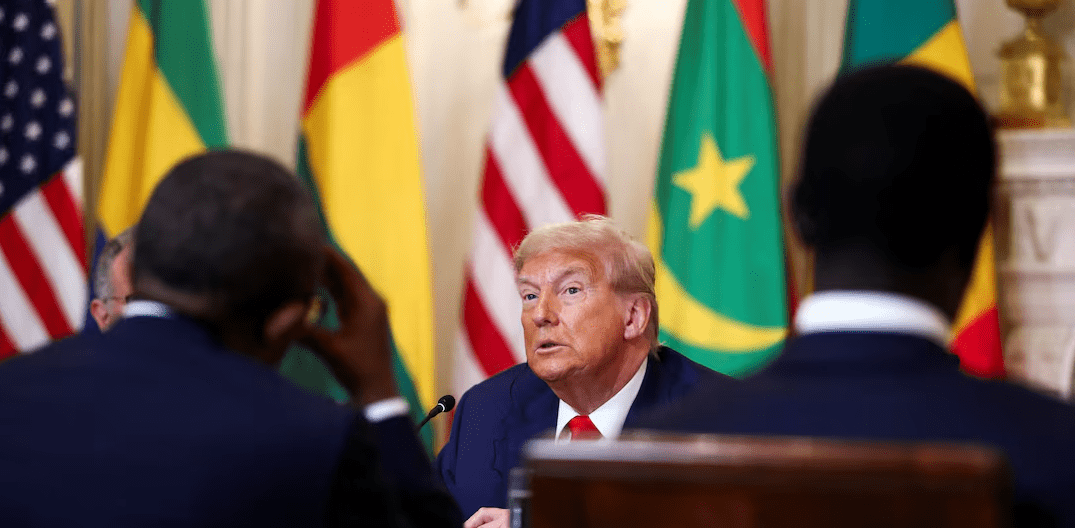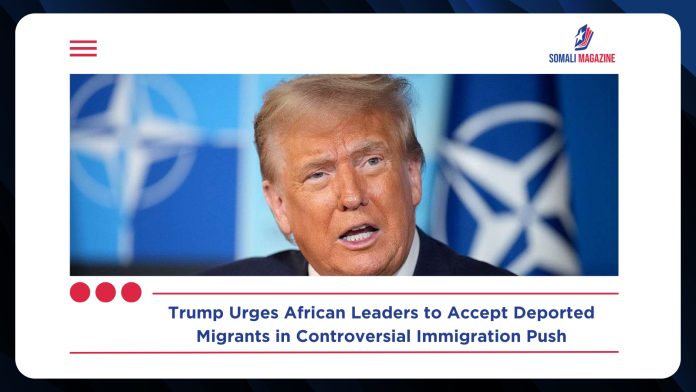Facebook Twitter (X) Instagram Somali Magazine - People's Magazine
Trump presses African leaders to take deported migrants, sources say, as the U.S. president intensifies efforts to reshape global migration policy through high-stakes diplomacy. During a closed-door summit at the White House on July 9, President Donald Trump urged the leaders of Liberia, Senegal, Guinea-Bissau, Mauritania, and Gabon to accept migrants deported from the United States—including individuals from third countries such as Cuba, Myanmar, and Sudan.
The proposal, presented as part of a broader shift from aid to trade, aims to accelerate deportations by rerouting migrants to African nations when repatriation to their home countries is delayed or legally contested. According to sources familiar with the discussions, Trump’s administration is seeking formal agreements that would allow for the “dignified, safe, and timely transfer” of migrants, with host countries agreeing not to return them to their original nations until U.S. asylum decisions are finalized.
Liberia is reportedly preparing to accommodate some of the deportees in its capital, Monrovia, though it remains unclear whether President Joseph Boakai has formally accepted the plan. The Wall Street Journal reported that internal State Department documents were circulated ahead of the summit, outlining the terms of the proposed arrangement and urging African governments to support the initiative.
The meeting, attended by Trump’s senior adviser for Africa Massad Boulos and immigration hardliner Stephen Miller, also touched on visa overstay rates and the possibility of establishing “safe third country” agreements. Trump emphasized that the U.S. is a better partner than China and reiterated his administration’s commitment to reducing illegal immigration through strategic partnerships.

The proposal has sparked concern among human rights advocates, who warn that outsourcing deportations to third countries could violate international protection norms and expose vulnerable migrants to further risk. Critics argue that the plan lacks transparency and accountability, especially given the absence of public comment from the five African governments involved.
The summit also reflects a broader geopolitical shift in U.S.-Africa relations. Trump’s administration has prioritized commercial diplomacy over traditional aid, seeking access to strategic minerals and trade routes while leveraging migration policy as a bargaining tool. Analysts say the inclusion of countries like Gabon and Mauritania—key players in maritime security and mineral exports—underscores Washington’s interest in securing long-term economic and security alliances.
In a related development, eight migrants from various countries were recently deported to South Sudan after losing legal battles in the U.S., raising questions about the feasibility and ethics of third-country transfers.
While Trump’s push for deportation deals may appeal to his domestic base, the international response remains mixed. Some African leaders view the proposal as an opportunity to strengthen ties with Washington, while others are wary of the political and humanitarian implications.
As negotiations continue, the fate of thousands of migrants hangs in the balance. Whether the plan will gain traction or face legal and diplomatic hurdles remains to be seen—but for now, Trump’s immigration diplomacy is reshaping the global conversation on migration, sovereignty, and strategic cooperation.

